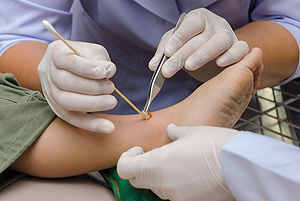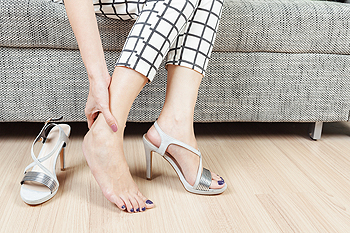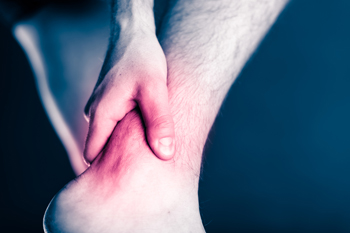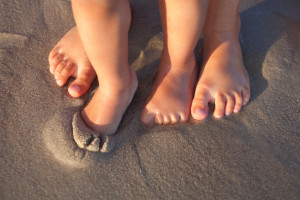Items filtered by date: March 2021
Arthritis Can Cause Pain in the Feet and Ankles
How Do I Prevent Diabetic Foot Ulcers?
 If you are diabetic, then you’ve likely heard about diabetic foot ulcers (DFUs). DFUs are wounds that form on the feet and heal poorly and very slowly. Because diabetes is associated with a loss of sensation and poor circulation in the feet, you may not feel these wounds when they first form. DFUs can develop anywhere on the feet or toes, but they most frequently appear on the soles of the feet, where they often go unnoticed until they produce symptoms such as fluid drainage. To avoid a surprising and painful discovery on the bottoms of your feet, it is important to take preventive measures. Wash your feet daily in warm, soapy water and dry them thoroughly. Moisturize the bottoms of the feet to avoid dry skin, which can crack and lead to wounds. Inspect your feet daily for any abnormalities, including new cuts, scrapes, sores, pain, or discoloration. If you find anything unusual, consult with a podiatrist as soon as possible.
If you are diabetic, then you’ve likely heard about diabetic foot ulcers (DFUs). DFUs are wounds that form on the feet and heal poorly and very slowly. Because diabetes is associated with a loss of sensation and poor circulation in the feet, you may not feel these wounds when they first form. DFUs can develop anywhere on the feet or toes, but they most frequently appear on the soles of the feet, where they often go unnoticed until they produce symptoms such as fluid drainage. To avoid a surprising and painful discovery on the bottoms of your feet, it is important to take preventive measures. Wash your feet daily in warm, soapy water and dry them thoroughly. Moisturize the bottoms of the feet to avoid dry skin, which can crack and lead to wounds. Inspect your feet daily for any abnormalities, including new cuts, scrapes, sores, pain, or discoloration. If you find anything unusual, consult with a podiatrist as soon as possible.
Diabetic foot care is important in preventing foot ailments such as ulcers. If you are suffering from diabetes or have any other concerns about your feet, contact Jordan S. Steinberg, DPM from Florham Park Podiatry . Our doctor can provide the care you need to keep you pain-free and on your feet.
Diabetic Foot Care
Diabetes affects millions of people every year. The condition can damage blood vessels in many parts of the body, especially the feet. Because of this, taking care of your feet is essential if you have diabetes, and having a podiatrist help monitor your foot health is highly recommended.
The Importance of Caring for Your Feet
- Routinely inspect your feet for bruises or sores.
- Wear socks that fit your feet comfortably.
- Wear comfortable shoes that provide adequate support.
Patients with diabetes should have their doctor monitor their blood levels, as blood sugar levels play such a huge role in diabetic care. Monitoring these levels on a regular basis is highly advised.
It is always best to inform your healthcare professional of any concerns you may have regarding your feet, especially for diabetic patients. Early treatment and routine foot examinations are keys to maintaining proper health, especially because severe complications can arise if proper treatment is not applied.
If you have any questions please feel free to contact our office located in Florham Park, NJ . We offer the newest diagnostic and treatment technologies for all your foot and ankle needs.
Can Anything Stop This Pain in the Ball of My Foot?
Morton’s neuroma occurs when tissues in the foot become thickened due to an injury, irritation, or excessive pressure on the nerves of the toes of the foot. Improperly-fitted shoes, high heels, high-impact activities, or even having a foot that is malformed can contribute to these nerves becoming damaged. Individuals with Morton’s neuroma can feel pain concentrated in the ball of the foot or between the 3rd and 4th toes, and may even experience a burning, tingling, or numbness. Podiatrists often treat Morton’s neuroma and reduce a patient’s pain with MLS Laser Therapy, which sends out multiple healing energy waves deep beneath the skin to repair nerves and tissues.
Morton’s neuroma is a very uncomfortable condition to live with. If you think you have Morton’s neuroma, contact Jordan S. Steinberg, DPM of Florham Park Podiatry . Our doctor will attend to all of your foot care needs and answer any of your related questions.
Morton’s Neuroma
Morton's neuroma is a painful foot condition that commonly affects the areas between the second and third or third and fourth toe, although other areas of the foot are also susceptible. Morton’s neuroma is caused by an inflamed nerve in the foot that is being squeezed and aggravated by surrounding bones.
What Increases the Chances of Having Morton’s Neuroma?
- Ill-fitting high heels or shoes that add pressure to the toe or foot
- Jogging, running or any sport that involves constant impact to the foot
- Flat feet, bunions, and any other foot deformities
Morton’s neuroma is a very treatable condition. Orthotics and shoe inserts can often be used to alleviate the pain on the forefront of the feet. In more severe cases, corticosteroids can also be prescribed. In order to figure out the best treatment for your neuroma, it’s recommended to seek the care of a podiatrist who can diagnose your condition and provide different treatment options.
If you have any questions, please feel free to contact our office located in Florham Park, NJ . We offer the newest diagnostic and treatment technologies for all your foot care needs.
How to Help Your Child Avoid an Ingrown Toenail?
Ingrown toenails are a painful and problematic malady for people of all ages and are actually quite common in children. While heredity may be the cause of your child’s ingrown toenail, there are things you can do to try and avoid them from developing. For instance, make sure your child’s footwear is large enough to accommodate not only the length, but also the width of the foot. Also, your child’s toenails should be trimmed straight across, and not cut too short—which can cause skin along the sides of the nail to grow over it. If one of your child’s toenails does become ingrown you can try soaking it in lukewarm water which softens the skin and may reduce any swelling or pain. Ingrown toenails can become quite painful and even infected. Do not attempt to dig the nail out; contact a podiatrist who will be able to safely treat the ingrown nail and treat any infection that may have occurred.
Making sure that your children maintain good foot health is very important as they grow. If you have any questions, contact Jordan S. Steinberg, DPM of Florham Park Podiatry . Our doctor can provide the care you need to keep you pain-free and on your feet.
Keeping Children's Feet Healthy
Having healthy feet during childhood can help prevent medical problems later in life, namely in the back and legs. As children grow, their feet require different types of care. Here are some things to consider...
Although babies do not walk yet, it is still very important to take care of their feet.
Avoid putting tight shoes or socks on his or her feet.
Allow the baby to stretch and kick his or her feet to feel comfortable.
As a toddler, kids are now on the move and begin to develop differently. At this age, toddlers are getting a feel for walking, so don’t be alarmed if your toddler is unsteady or ‘walks funny’.
As your child gets older, it is important to teach them how to take care of their feet.
Show them proper hygiene to prevent infections such as fungus.
Be watchful for any pain or injury.
Have all injuries checked by a doctor as soon as possible.
Comfortable, protective shoes should always be worn, especially at play.
If you have any questions please feel free to contact our office located in Florham Park, NJ . We offer the newest diagnostic and treatment technologies for all your foot and ankle needs.
Effective Foot Stretches and High Heels
 Wearing high heels is popular among many women. While they can positively enhance the appearance of the legs, they may cause uncomfortable foot conditions. It may be beneficial to frequently practice specific foot stretches in order to help diminish possible foot ailments from wearing high heels. An effective stretch consists of placing the fingers between the toes, while gently pulling down and strengthening the top of the foot. The bottom of the foot can become stronger when a towel is placed on the sole of the foot while lying down. You will feel a stretch as the leg is extended upward, and the towel is pulled toward the face. If you would like additional information about how to keep the feet healthy while wearing high heels, please consult with a podiatrist.
Wearing high heels is popular among many women. While they can positively enhance the appearance of the legs, they may cause uncomfortable foot conditions. It may be beneficial to frequently practice specific foot stretches in order to help diminish possible foot ailments from wearing high heels. An effective stretch consists of placing the fingers between the toes, while gently pulling down and strengthening the top of the foot. The bottom of the foot can become stronger when a towel is placed on the sole of the foot while lying down. You will feel a stretch as the leg is extended upward, and the towel is pulled toward the face. If you would like additional information about how to keep the feet healthy while wearing high heels, please consult with a podiatrist.
High heels have a history of causing foot and ankle problems. If you have any concerns about your feet or ankles, contact Jordan S. Steinberg, DPM from Florham Park Podiatry . Our doctor can provide the care you need to keep you pain-free and on your feet.
Effects of High Heels on the Feet
High heels are popular shoes among women because of their many styles and societal appeal. Despite this, high heels can still cause many health problems if worn too frequently.
Which Parts of My Body Will Be Affected by High Heels?
- Ankle Joints
- Achilles Tendon – May shorten and stiffen with prolonged wear
- Balls of the Feet
- Knees – Heels cause the knees to bend constantly, creating stress on them
- Back – They decrease the spine’s ability to absorb shock, which may lead to back pain. The vertebrae of the lower back may compress.
What Kinds of Foot Problems Can Develop from Wearing High Heels?
- Corns
- Calluses
- Hammertoe
- Bunions
- Morton’s Neuroma
- Plantar Fasciitis
How Can I Still Wear High Heels and Maintain Foot Health?
If you want to wear high heeled shoes, make sure that you are not wearing them every day, as this will help prevent long term physical problems. Try wearing thicker heels as opposed to stilettos to distribute weight more evenly across the feet. Always make sure you are wearing the proper shoes for the right occasion, such as sneakers for exercising. If you walk to work, try carrying your heels with you and changing into them once you arrive at work. Adding inserts to your heels can help cushion your feet and absorb shock. Full foot inserts or metatarsal pads are available.
If you have any questions please feel free to contact our office located in Florham Park, NJ . We offer the newest diagnostic and treatment technologies for all your foot and ankle needs.
Why Is the Outside of My Ankle Swollen?
 The outer part of your ankle may be swollen due to an injury or because of an underlying medical condition. Ankle injuries such as sprains, fractures, and tendinopathies can make the ankle swell. Arthritis can affect any joint in the body, including the ankle joint. When the arthritic ankle joint is inflamed, it can cause the ankle to swell. You may also notice symptoms like warmth and redness around the joint and difficulty moving the ankle. Cellulitis, a skin infection, can also make the feet and lower legs swell. If you notice swelling around your ankle, it is suggested that you see a podiatrist for treatment.
The outer part of your ankle may be swollen due to an injury or because of an underlying medical condition. Ankle injuries such as sprains, fractures, and tendinopathies can make the ankle swell. Arthritis can affect any joint in the body, including the ankle joint. When the arthritic ankle joint is inflamed, it can cause the ankle to swell. You may also notice symptoms like warmth and redness around the joint and difficulty moving the ankle. Cellulitis, a skin infection, can also make the feet and lower legs swell. If you notice swelling around your ankle, it is suggested that you see a podiatrist for treatment.
Ankle pain can be caused by a number of problems and may be potentially serious. If you have ankle pain, consult with Jordan S. Steinberg, DPM from Florham Park Podiatry . Our doctor will assess your condition and provide you with quality foot and ankle treatment.
Ankle pain is any condition that causes pain in the ankle. Due to the fact that the ankle consists of tendons, muscles, bones, and ligaments, ankle pain can come from a number of different conditions.
Causes
The most common causes of ankle pain include:
- Types of arthritis (rheumatoid, osteoarthritis, and gout)
- Ankle sprains
- Broken ankles
- Achilles tendinitis
- Achilles tendon rupture
- Stress fractures
- Bursitis
- Tarsal tunnel syndrome
- Plantar fasciitis
Symptoms
Symptoms of ankle injury vary based upon the condition. Pain may include general pain and discomfort, swelling, aching, redness, bruising, burning or stabbing sensations, and/or loss of sensation.
Diagnosis
Due to the wide variety of potential causes of ankle pain, podiatrists will utilize a number of different methods to properly diagnose ankle pain. This can include asking for personal and family medical histories and of any recent injuries. Further diagnosis may include sensation tests, a physical examination, and potentially x-rays or other imaging tests.
Treatment
Just as the range of causes varies widely, so do treatments. Some more common treatments are rest, ice packs, keeping pressure off the foot, orthotics and braces, medication for inflammation and pain, and surgery.
If you have any questions, please feel free to contact our office located in Florham Park, NJ . We offer the newest diagnostic and treatment technologies for all your foot care needs.



